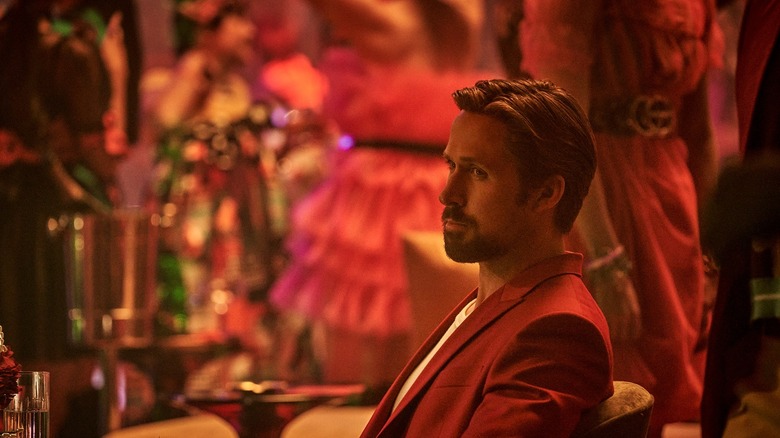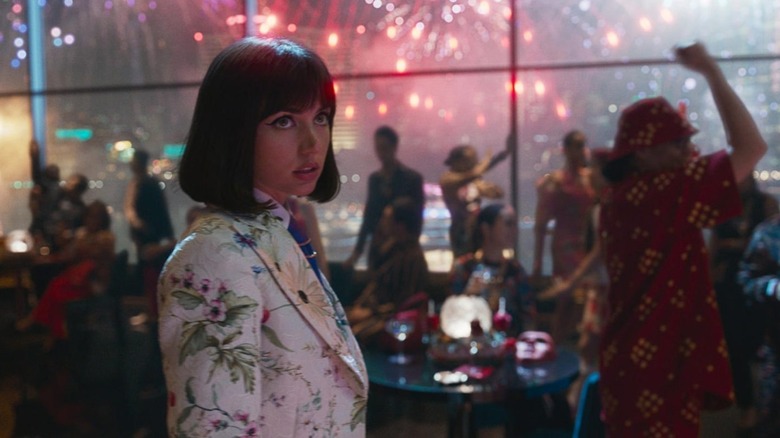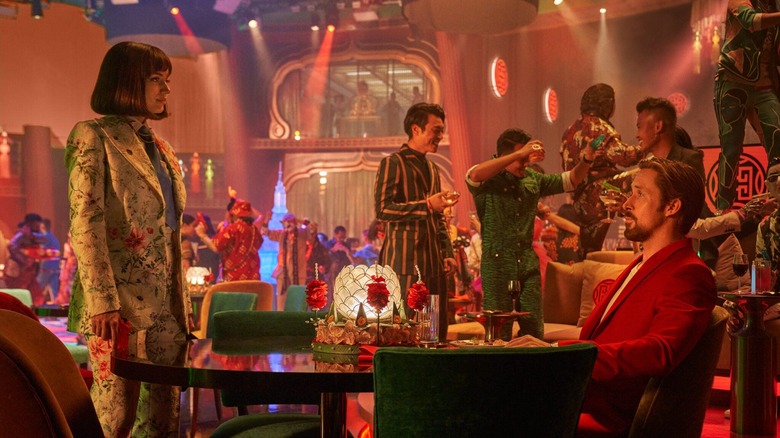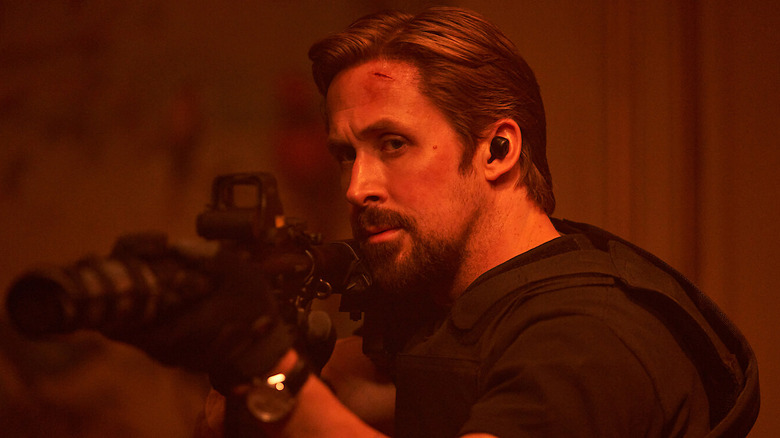The Gray Man Composer Henry Jackman On How He Created An Epic 17-Minute Suite [Interview]
Henry Jackman composed a 17-minute suite for "The Gray Man." It's a rollercoaster of a track that introduces audiences to the spy world, based on Mark Greaney's series of books. The suite is every bit as big as the Russo Brothers' almost comically mammoth popcorn movie. Jackman, however, did not want to go big for the sake of going big. He was led by intuition, not all the extremely expensive bells and whistles on display.
Rarely does a composer talk about composing a piece of music with such suspense and personal stakes, but the stakes were high for the music man behind "The Gray Man." Jackman, who previously scored "Captain America: The Winter Soldier" and other Russo Brothers projects, spent eight months on the suite alone. Why the 17-minute track took so long is a story Jackman told to us in great detail during a recent interview about "The Gray Man."
'This 17-minute epic that nearly killed me'
How did you end up with the 17-minute suite?
The origin of that track is it's something I've done before, but never to this extent. For example, working with Joe and Anthony, as I've done on many movies, you get a real collaboration of trust going. And so, quite often I will write a suite away from picture because I'm a big believer in, if you just dive straight into a movie and pick a scene and start writing, you're going to get distracted by the individual requirements of that scene and not necessarily think big picture. With the overall tone of a movie and an overall theme, you're almost better off developing ideas away from picture, kind of laboratory work or research and development for a company or something.
I've done that before. There's a track on ["Captain America: The Winter Soldier"] called "Winter Soldier," and that's essentially the suite. I originally wrote that with me just going, "I believe 'Winter Soldier' should sound like this, and then worry later about how it works." I've done several four-minute [suites] and probably spent a week or two on them and made sure the director or Joe and Anthony heard them along the way. Now, this is slightly different. What happened with this 17-minute epic that nearly killed me was me and my partner had our first kid, James.
Congratulations.
Thank you very much. So James was born in March 2021 and I knew I wouldn't have to start getting into the nitty gritty of writing cues specifically for "Gray Man," let's say, until December 2021, because we were recording in April 2022. I thought I'll try, instead of being the classic busy dad, who's useless and never around, I'll change diapers and be like a good dad. I thought I'll kind of say no to work from after James was born until I start "Gray Man," so I can actually see this beautiful little creature growing up.
Joe and Anthony called. They were shooting "Gray Man" going, "Hey, just a quick thought for you, obviously 'Gray Man' is a huge action film, but today we were shooting with Ryan [Gosling] and it was one of those more flashback scenes where he is traumatized about his past. Just putting out there, as an artist, also think about a slightly damaged, internalized broken emotional [aspect] as well." I went to the piano and came up with this little thing that I called the "ghost in the machine" kind of an idea. I quickly banged it out on the piano going, "Oh, that's cool." I put it to bed and after I changed a few diapers, I was like, "You know what? Let me go back to that idea properly. I'll record it. I'll record it nicely and process it and put some of that backwards reverb on it and make a real thing out of it. At least I've got this cool two-and-a-half minute, emotional ghost in the machine idea that I can play Joe and Anthony."
So, in between changing diapers, I finished that up. Sonically, it was all nicely engineered and sounded cool. As I finished, I got this cool kickdrum sound in mind, a low end sound. I just started going, "Oh yeah, no, that's cool." I got the tempo I liked. I liked the feeling, the rhythm of that is in a slightly unusual rhythm. It's in five four — not to bore your readers, but it's a slightly esoteric pattern.
I say, "Well, I'll leave that for now. I'll just bang in that little percussion sound that's hammering away that one little pattern. I'll save that for later." When I come to December, I've got the beginning of a rhythm. After endless crying and screaming and not sleeping and dealing with the song, I say, "You know what? Let me go back to that kick idea, develop it a bit." I started making more and more processed percussion sounds and chopping up break beats and distorting them and built this whole arsenal of hard baked percussion sounds that don't really sound like your standard issue, big Hollywood drum sound. It was a lot of almost slightly drum- and bass-influenced palette of sounds.
And then I started building this big bass. I said, "Okay, cool. I'm going to stop now. I've got a cool emotional piano intro. I've got a really cool collection of percussion sounds. I'm more than ready for this 'Gray Man' movie coming up." I said, "Well, you know what? I might as well start fiddling around with some harmonic stuff and get, what kind of chords do I want to use?" It developed a bit more. I said, "Look, once I get to five minutes, I'll stop. Let me get to the piano." Then I started going, "Well, perhaps the same chords I was using at the piano at the front, maybe that can start coming in on a pattern." I was like, "Oh, wait a minute. What about this? Oh, that's a cool bass. All right, all right, let me pursue this bass line for a bit."
I promise myself I'm going to stop. This is just getting out of control because I've probably been on it for three months. And also, unlike a lot of regular film scores, I'm engineering like crazy. It's much more like a record where I'm spending forever processing. I could spend a whole day engineering one sound to make it sound unique, so it's taking up a lot of time.
In the back of my head, I'm thinking, "Wait a minute, I should play some of this to Joe and Anthony. If they don't like where this is going, this is months of my life disappearing and my partner's going to go 'Well, if they didn't like it, we could have had a proper nine months off instead.'" But I started feeling very secretive about no, no, I don't want anyone to hear this yet. I want to explore it.
And then I thought, "How about these sort of jazz chords, but they've gone a bit wrong, like atonal jazz?" It sounds kind of badass, old school, like Chemical Brothers meets some drummer bass background, but then the chords feel like [composer] John Barry gone mad or maybe even one of those almost jazzy '70s scores. It's dangerous-sounding. So I pursued that and that went on and on and on. I said, "Okay, now I'm definitely going to stop."
Then I had that other idea right at the end, this big kind of Mancini thing. I was like, "Oh, bloody hell. Now I've come over with another thing that I've got to pursue. How long is this thing?" We're 17 minutes and I'd spent so long on this thing. And the longer I spent on it, the more I was like, "My God, if Joe and Anthony don't see this as the direction to go, I'm such an idiot. I've spent so long on it and I've engineered the living hell out of it. It really sounds like something you need, but whatever, it's just an artistic endeavor. It's too late now, I'm so far down the road, I've got to finish this piece to its natural conclusion."
Anyway, we nearly got our first cut of this movie. I said, "I've got a little secret." Joe said, "Oh, you haven't done one of your suites." I said, "Yep, not only have I done one of my suites, I've secretly been working on it for eight months." And he's, "Oh my God, send it to me now." I say, "Well, I'm actually nervous to play it to you because right now I'm living in this space of psychological freedom, but I love it. If I send it to you and you go, 'Oh, it's fantastically put together and everything, but maybe not what we need,' then I basically just wasted eight months of my life."
I said, "Let me just sleep on it. Give me one more night of freedom where I can just forget about it. I'll send it to you in the morning. Otherwise I won't sleep all night." I sent it to the boys in the morning and they absolutely loved it, thank God. I think Joe was even texting me as he was listening to it live for the first time, going, "Oh, I love the bass line." Joe and Anthony, they got great imagination. They were already, even as they were listening, going, "Oh, this is going to work for this and that."
I was just so relieved that I didn't have to go to Victoria, my partner, and go, "We could have basically just spent nine months, raising our wonderful little child and I needn't have sat there like a mad professor because they hated it." They absolutely loved it. Now, I said to Joe and Anthony, "Listen, please, on the basis of this precedent, do not expect me every single time we work together to be fiddling away for nine months on a 17-minute suite because I've had points in my career in this space of nine months, I've done three whole movies."
I suppose if we have another kid and I take another nine months off and it happens to time itself with another Joe and Anthony thing, I guess I could spend another nine months on it. In film music, very often you do an entire score in three months, but a certain part of me kicked in that's more rooted in the days of, when I was younger, when I used to hang out with [record producer] Trevor Horn, who would spend four years on a Seal album or two and a half years on an Art of Noise album. There were these great labors of love with all manner of exploration and seeing how far you could take something.
Now, you can't quite do that with scores. I guess, because I did have the time, I got more into that exploratory spirit of seeing what happens with a piece of music, if there are no restrictions put on it. I wasn't just writing any old crap to scenes. In the back of my head, this has to be appropriate to "Gray Man." We need the energy, the driving bass line. Wouldn't have been something I thought of if it was a character drama with Helen Mirren.
'You kind of lose control of it'
How'd you find the right pace for those 17 minutes?
Well, it takes a while. If you listen to the piece, it takes a while for the orchestra. After that piano piece, I spent a lot of time demonstrating all the crazy production sounds. And then as the piece develops, the orchestra gets more and more involved until you get to that huge, slightly Mancini-esque ending. Because in the back of my head, I remember Joe saying, "I don't really know what the music should do and that's why we trust you. Do your thing. The one thing I know is by the time this movie's done, at some point, we need to do all that weird, cool sh*t you do. At some point, I think we're going to need a massive orchestra." I'm like, "Yep, you're probably right. Let me focus on all the weird, crazy stuff first." That's what I was thinking internally, which is why as the suite develops, it starts with all the non-traditional stuff. As it develops, you start to hear the orchestra develop more and particularly at the end, the last two minutes is a big orchestral explosion of theme at the end.
At the end, you go big with the horns, too, almost like an old school spy movie.
Yeah, exactly. I threw in one of those like bam, bam, bam, right at the end, that was my little party piece at the end just to bring a smile to the face. At a certain point, the piece of music takes on its own life and you become a servant of the piece of music. You kind of lose control of it. Until I got to that huge theme at the end, it's like, "Okay, there's nowhere else to go now. That's it. After that big theme at the end, for God's sake, stop."
So you mentioned The Chemical Brothers, and in your past, you were into the rave scene. When you compose a suite as epic as that, do you think back on your rave days at all, like, how to best energize the audience?
Well, maybe not because I was never a DJ. I was super strictly classically brought up, but I used to go to loads of raves. There is something about the structure of music when you're writing a much more classical score. It's a big orchestra and it hasn't got any of these distorted break beats or anything like that. It has a different structure, whereas I think the fact that I have listened to so much what was then underground music, the structure does have an effect on you in that whole idea of something that's building and building and building and then it stops. And then it kicks in, those kinds of structures where you're teasing, teasing, teasing, then you have a bit of a hole and then bang, it kicks off. It's much more a DJ structure or a club music structure.
If you listen to that suite, there are a couple of times where there's a really long rising bass line. And you're like, "Here it comes, here it comes." And then there are a couple of beats of silence and then — bang — it kicks in and those kinds of techniques are very nonclassical. That is a bit more, like you say, winding people up and then you drop the bass line or the main groove. In those early stages, for example, when that distorted break beat first kicks in, there's a little tease before it and a little gap and then it kicks in. I can think of a few German bass things, I know Adam F had a tune called "Metropolis" that has a really tease-y front and then the beat kicks in later. Now, that's not so relevant at the end of the suite when all the melody and the themes are in.
I spent ages getting a sound on all those break beats and mashing them up or getting my own percussion sounds and fuzzing them up and everything, which when you mention Chemical Brothers, you could think of bunch of things they've done that have those mashed-up drums that are not trying to sound realistic. It's not trying to sound like a completely regular drum sound. Remember "Block Rockin Beats?" The drums are somewhat organic, but they've been chopped up, recycled, and pretty heavily damaged. It has the feeling that it doesn't sound like an 808 drum machine. It feels drummer-ish, but it's heavily processed. That probably had an influence on me.
Obviously the main difference with this suite is all kinds of dance music, it's always in four four, whereas this thing's in five four, which is more of an espionage kind of a rhythm. You'd very rarely find any club track that's in five four. It'd be like, "Wait a minute, it's in five, I don't know how to dance, what the hell's going on?" It's got to be in four.
'I did loads of crusty old school engineering'
So, in your suite, like The Chemical Brothers did with drums, you wanted to make a lot of the instruments sound damaged?
Exactly. What I did with all the percussion sounds is develop sounds or record them myself. The sound sources are organic, but then process them and process them until they sound really colored. I was shoving recordings through my old crumbly, rolling [monophonic synthesizer] SH-5 and filtering it and overdriving it. I did loads of crusty old school engineering. It just sounds grungy and a bit overdriven.
I would spend ages on one sound, a bit like varnishing it and coloring it and damaging it and messing around with it. After three days of nonstop engineering, I've now got a sound that I really like, that doesn't really sound like anyone. I kept doing that to all these different percussion sounds until I had my own sort of family of sounds where each one had been really, really worked on. The origin of the sounds was acoustic, but I damaged them a lot.
By the way, to circle back, you're the first composer I've spoken to who not only needed a suite to please the filmmakers but also their partner.
[Laughs] Oh God. No, [my partner] V's so supportive of all artistic endeavors, but yeah, it would've been difficult to keep a straight face and explain why I spent that long without playing it to anyone, had it got shot down in flames. It would've been like, you idiot. Almost the first thought when I saw that Joe and Anthony really liked it was like, "Oh, thank God, I don't have to explain what an idiot I am."
Obviously, with those 17 minutes, you kick the film off with the bang. In the end, though, was it an immediate choice not to score the final fight?
You can't have everything all the time. For example, the first major spectacular action sequence involves Six, where they attempt to assassinate him on the plane and all hell breaks loose, the plane's falling apart, the engines crash, he jumps out, it's absolute chaos. This sequence should be a super sound-effect heavy. Let's think about it from a filmmaking point of view. It's pretty realistic. The plane's crashing. The engines are screaming. We'll play this one pretty straight. And so during all that carnage, let's not worry about music.
Conversely, in the massive Prague sequence where there's still a lot going on, there's a lot of gunfire. That was like, "Okay, we will establish some realistic stuff and a lot of gunfire and whatnot, but at a certain point in that sequence, let's go the other way. Let's push music and not have to worry about every single time a gun fires you keep hearing it super loud, every single time." Different sequences had different approaches.
The Prague sequence is probably eight minutes long. A good chunk of that Prague sequence is music-heavy, whereas a big chunk of that airplane sequence in reel two is sound-effects heavy. It's just decisions to make like that. You can't have everything all the time because you end up with nothing.
As an audience member, you do want a little music when you watch Ryan Gosling jump off a train, though.
Exactly. I think we made the right call. I think it would've been the wrong call to go music-crazy early, too, in the plane, and go super realistic and only have sound effects in the Prague sequence, because the Prague sequence is a bit operatic. It lasts so long. It's almost a giant crazy violent ballet. You're right, by the time you get to the end of that [Prague] sequence, you want the elevation of music. It's not supposed to be a hundred percent, audio realistic. It has to have that extended element. So, it was a fairly clear decision because you can't have everything. You can't have the sound effects and music going for everything all the time.
How about the build up to the final fight in the maze? What'd you want to communicate there and conclude the themes?
Well, that was very enjoyable because it reminded me of those old Clint Eastwood movies. Joe and Anthony are really influenced by '70s filmmaking. "Dirty Harry," they always seem to have the climactic scene where he's trying to hunt the killer down in an empty baseball arena. After all the crazy action that had been going on in the third act of the movie, it was nice to have a sort of weirdness, this toxic atmospheric weirdness. Going into the maze gave me as the composer an invitation to be able to explore this one last color that is not so furious and not so action-driven.
In fact, the last fight at the fountain is a bit trippy. It's more kind of an almost Brian Eno-influenced, spiritual fight. I can't remember what we called it. "Sunrise Under Our Blood Red Sun?" If you listen to it, it's more of an emotional piece. You wouldn't think, "Oh yeah, this is obviously an action scene." By the time you get to the climactic fight scene, it's questionable whether the actual fight is really between him and his adversary or between him and his own demon.
"The Gray Man" is now streaming on Netflix.



